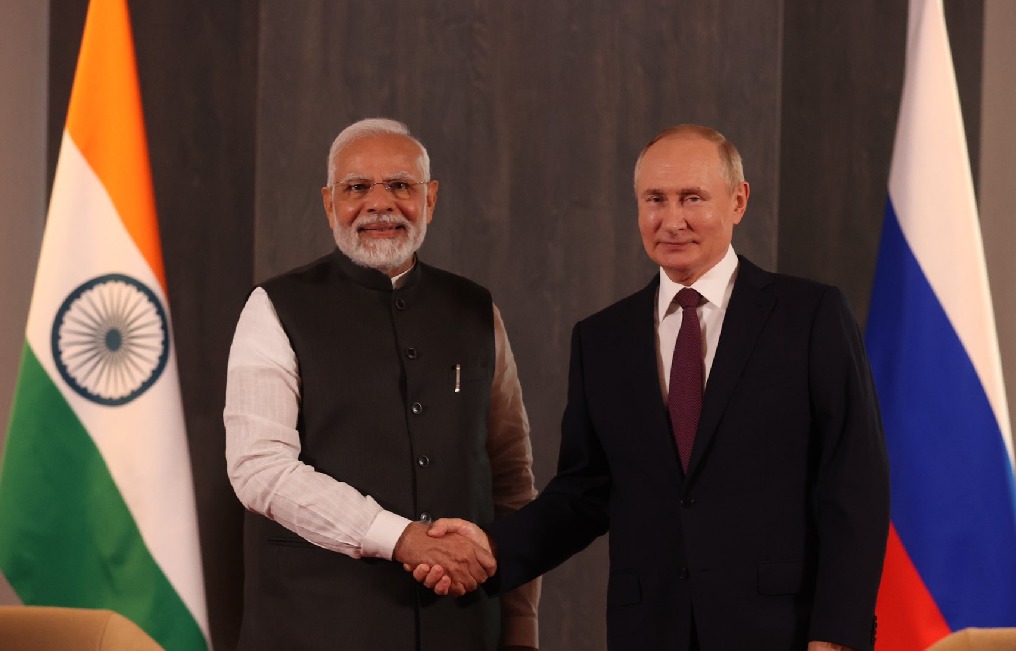Russian President Vladimir Putin is set to visit India, Russia’s top diplomat, Sergey Lavrov, said in a video address to a conference titled “Russia and India: Toward a New Bilateral Agenda”, Tass reported.
“President Vladimir Putin has accepted an invitation to visit from the Indian head of government. A visit by the Russian head of state to the Republic of India is currently being prepared,” the Russian foreign minister announced.
Lavrov noted that PM Modi paid his first foreign visit to Russia upon his re-election last year. “Now it’s our turn,” he said.
Since Russia’s invasion of Ukraine, India-Russia relations have navigated a difficult landscape, balancing historical ties with harsh geopolitical realities.
India has maintained a neutral stance on the Ukraine war, abstaining from United Nations resolutions condemning Russia and refraining from public criticism of Moscow.
This position reflects New Delhi’s strategic calculus: preserving a decades-long alliance with Russia, a vital supplier of defense equipment and a counterweight to China, while avoiding entanglement in the West’s confrontation with Moscow.
PM Modi has emphasized peace through dialogue, notably telling Russian President Vladimir Putin in September 2022 that “today’s era is not an era of war,” a subtle nudge rather than a rebuke.
Economically, the war has deepened ties. Facing Western sanctions, Russia offered India discounted oil, which New Delhi eagerly accepted. This energy lifeline has bolstered India’s energy security and indirectly supported Russia’s war economy, drawing Western scrutiny but aligning with India’s pragmatic interests.
Defense cooperation, a cornerstone of the relationship, has faced challenges. Russia’s constrained production capacity due to the war has delayed deliveries, such as the S-400 air defense systems, prompting India to diversify its arms procurement.

Yet, Russia remains a vital partner, as seen in the March 2025 deal for advanced tank engines (T.72 and T-90), signaling continued reliance despite the war’s disruptions. India is also looking to replace engines for Su-30 MKI fighters, and New Delhi is expected to make a decision soon.
The growing Russia-China alignment complicates matters for India, given its rivalry with Beijing. New Delhi fears a diminished Russian role as a balancer against China, yet it has leveraged its ties with Moscow to maintain strategic autonomy.
Modi’s diplomatic engagements—visiting Russia in 2024 and hosting Ukrainian leaders—position India as a potential mediator, a role the United States has encouraged, urging India to use its influence to push Putin toward peace.
The Western world strongly believes that China is the biggest “enabler” of Russia in its war against Ukraine and that Beijing is a big flouter of international laws and the world order; playing a mediatory role does not generate that much confidence in them.
On the other hand, India has reasons to be taken seriously by both Russia and the U.S.-led West. Modi seems to have Putin’s support. America may not have liked India’s “strategic autonomy” and its continuing links with Russia, but the fact remains that India is “the swing power” in its real rivalry with China, Washington’s principal geopolitical adversary in the world.
For the West, India can deliver a large geopolitical payoff because both share the same approach to the international order that is more fluid and open than that of China or Russia. India has invariably behaved as a responsible power. It respects territorial sovereignty for all nations and advocates for rule-based governance and ‘security and growth for all.’
Via: ET Desk




